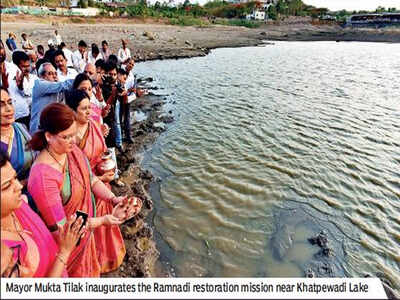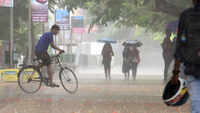
The massive Ramnadi Restoration Mission, set to involve nearly 15,000 students from 38 colleges and 13 city-based environmental groups, was officially kicked off on Tuesday.
Mayor Mukta Tilak, who inaugurated the initiative at a ceremony near Khatpewadi Lake, one of the origin points of the river, said the citizen movement would receive the full support of the Pune Municipal Corporation.
“Stretches of the Ramnadi that flow through Baner, Aundh, Balewadi, Bavdhan are under civic limits. As the PMC takes citizen engagement programmes very seriously, it will extend its full support to the endeavour and will help the 13 organisations that are part of this mission with manpower and equipment,” Tilak said during the inaugural event, held a day before World Environment Day on June 5.
The mayor was joined at the event by BJP MLA Medha Kulkarni and R R Deshpande, the CEO of Kirloskar Oil Engines Ltd.
The Ramnadi Restoration Mission is set to become the biggest ever river clean-up project in Pune. Besides the sheer number of student participants and the involvment of major citizen organisations, the intiative will also involve residents of several large housing societies and villages located along the 18-km long river.
The Ramnadi flows through Khatpewadi, Bhugaon, Bhukum, Bavdhan, Pashan, Baner and Aundh and has been in a troubled state for decades.
Years of uncontrolled dumping of garbage and untreated waste have nearly destroyed the ecological diversity along the river. In 2015, the National Green Tribunal, while responding to complaints of encroachment and dumping of garbage, had called for a stop on all construction along the river’s banks. But participants on Tuesday said they would do their best to bring Ramnadi back to what it was at least 70 years ago.
Phase 1 of the restoration project starts from Wednesday with the rejuvenation of Khatpewadi Lake. “It’s important to arrest soil erosion first, as it will ultimately affect the lake’s capacity,” said Shailaja Deshpande, founder member and director of river conservation NGO Jeevitnadi. “We will ensure that all the work undertaken does not disturb the lake’s ecosystem,” she added.
Ketaki Ghate, co-founder of Oikos, an organisation that works towards ecological restoration, designed the eco-restoration plan for Khatpewadi lake.
“We will begin the restoration work by removing all the dead silt from the water body. Desilting is extremely important for this job. It will increase the lake’s capacity to a certain extent. We will use it to turn the steep slopes into gradual ones. Plantation will also be done along the lake this year. We hope to complete the work on the lake within the next two years. We will also try to introduce small islands in the lake this year if the monsoon permits,” Ghate said.
The small islands are part of a plan to ensure migratory birds that visit the river have spaces to nest and rest.
As to how the mission was planning to ensure the efforts were long lasting, Ghate said the movement would rely on citizen participation.
“We are working with local residents to make sure the conservation and protection efforts are long lasting. We will try and include more people as part of this mission,” she said.
During his speech at the start of the inauguration event, Anil Gaikwad, founder of Vasundhara Swachata Abhiyan, said: “Through this mission, we will try and restore Ramnadi’s health to a state it was in 70 years ago. Back then, people used to drink this river’s water without any worry. Today, because of all this pollution, that has become impossible. This project will change all that.”
Virendra Chitrav, director of the Kirloskar Vasundhara International Film Festival (KVIFF), said: “Many citizens’ organisations are coming together for the rejuvenation of the Ramnadi river. Brainstorming sessions were held for over two months about how to launch the restoration mission.”
In her address, MLA Medha Kulkarni, who has been previously involved in river cleanliness programmes, said: “It is important for everyone to come together to implement this plan that hopes to restore Ramnadi. Everyone only focuses on the Mula and Mutha. Though they are equally important, it is time to also look towards Ramnadi’s restoration. Sewage seeps into the river, affecting its health majorly. This needs to be stopped on priority.”
Gurudas Nulkar, part of the core team of the Ecological Society, said: “Human centricity is key to this mission. We will try and overcome the villagers’ anxieties and fears through this mission. We will transform the Khatpewadi Lake from a water reservoir to an aquatic ecosystem.”
Mayor Mukta Tilak, who inaugurated the initiative at a ceremony near Khatpewadi Lake, one of the origin points of the river, said the citizen movement would receive the full support of the Pune Municipal Corporation.
“Stretches of the Ramnadi that flow through Baner, Aundh, Balewadi, Bavdhan are under civic limits. As the PMC takes citizen engagement programmes very seriously, it will extend its full support to the endeavour and will help the 13 organisations that are part of this mission with manpower and equipment,” Tilak said during the inaugural event, held a day before World Environment Day on June 5.
The mayor was joined at the event by BJP MLA Medha Kulkarni and R R Deshpande, the CEO of Kirloskar Oil Engines Ltd.
The Ramnadi Restoration Mission is set to become the biggest ever river clean-up project in Pune. Besides the sheer number of student participants and the involvment of major citizen organisations, the intiative will also involve residents of several large housing societies and villages located along the 18-km long river.
The Ramnadi flows through Khatpewadi, Bhugaon, Bhukum, Bavdhan, Pashan, Baner and Aundh and has been in a troubled state for decades.
Years of uncontrolled dumping of garbage and untreated waste have nearly destroyed the ecological diversity along the river. In 2015, the National Green Tribunal, while responding to complaints of encroachment and dumping of garbage, had called for a stop on all construction along the river’s banks. But participants on Tuesday said they would do their best to bring Ramnadi back to what it was at least 70 years ago.
Phase 1 of the restoration project starts from Wednesday with the rejuvenation of Khatpewadi Lake. “It’s important to arrest soil erosion first, as it will ultimately affect the lake’s capacity,” said Shailaja Deshpande, founder member and director of river conservation NGO Jeevitnadi. “We will ensure that all the work undertaken does not disturb the lake’s ecosystem,” she added.
Ketaki Ghate, co-founder of Oikos, an organisation that works towards ecological restoration, designed the eco-restoration plan for Khatpewadi lake.
“We will begin the restoration work by removing all the dead silt from the water body. Desilting is extremely important for this job. It will increase the lake’s capacity to a certain extent. We will use it to turn the steep slopes into gradual ones. Plantation will also be done along the lake this year. We hope to complete the work on the lake within the next two years. We will also try to introduce small islands in the lake this year if the monsoon permits,” Ghate said.
The small islands are part of a plan to ensure migratory birds that visit the river have spaces to nest and rest.
As to how the mission was planning to ensure the efforts were long lasting, Ghate said the movement would rely on citizen participation.
“We are working with local residents to make sure the conservation and protection efforts are long lasting. We will try and include more people as part of this mission,” she said.
During his speech at the start of the inauguration event, Anil Gaikwad, founder of Vasundhara Swachata Abhiyan, said: “Through this mission, we will try and restore Ramnadi’s health to a state it was in 70 years ago. Back then, people used to drink this river’s water without any worry. Today, because of all this pollution, that has become impossible. This project will change all that.”
Virendra Chitrav, director of the Kirloskar Vasundhara International Film Festival (KVIFF), said: “Many citizens’ organisations are coming together for the rejuvenation of the Ramnadi river. Brainstorming sessions were held for over two months about how to launch the restoration mission.”
In her address, MLA Medha Kulkarni, who has been previously involved in river cleanliness programmes, said: “It is important for everyone to come together to implement this plan that hopes to restore Ramnadi. Everyone only focuses on the Mula and Mutha. Though they are equally important, it is time to also look towards Ramnadi’s restoration. Sewage seeps into the river, affecting its health majorly. This needs to be stopped on priority.”
Gurudas Nulkar, part of the core team of the Ecological Society, said: “Human centricity is key to this mission. We will try and overcome the villagers’ anxieties and fears through this mission. We will transform the Khatpewadi Lake from a water reservoir to an aquatic ecosystem.”
Quick Links
Lok Sabha Election Schedule 2019Lok Sabha Election NewsDelhi Capitals teamMI team 2019Rajasthan Royals 2019RCB team 2019Maharashtra Lok Sabha ConstituenciesBJP Candidate ListBJP List 2019 TamilnaduShiv Sena List 2019AP BJP List 2019Mamata BanerjeeBJP List 2019 MaharashtraPriyanka GandhiBJP List 2019 KarnatakaAMMK Candidate List 2019BJP List 2019 WBLok Sabha Elections in Tamil NaduBSP List 2019 UPNews in TamilLok Sabha Poll 2019Satta Matka 2018PM ModiMahagathbandhanNagpur BJP Candidate ListChandrababu NaiduTamil Nadu ElectionsUrmila MatondkarNews in TeluguMadras High CourtTejashwi YadavArvind KejriwalTejasvi SuryaPawan KalyanArvind KejriwalYogi AdityanathJaya PradaSatta King 2019Srinagar encounter
Get the app









